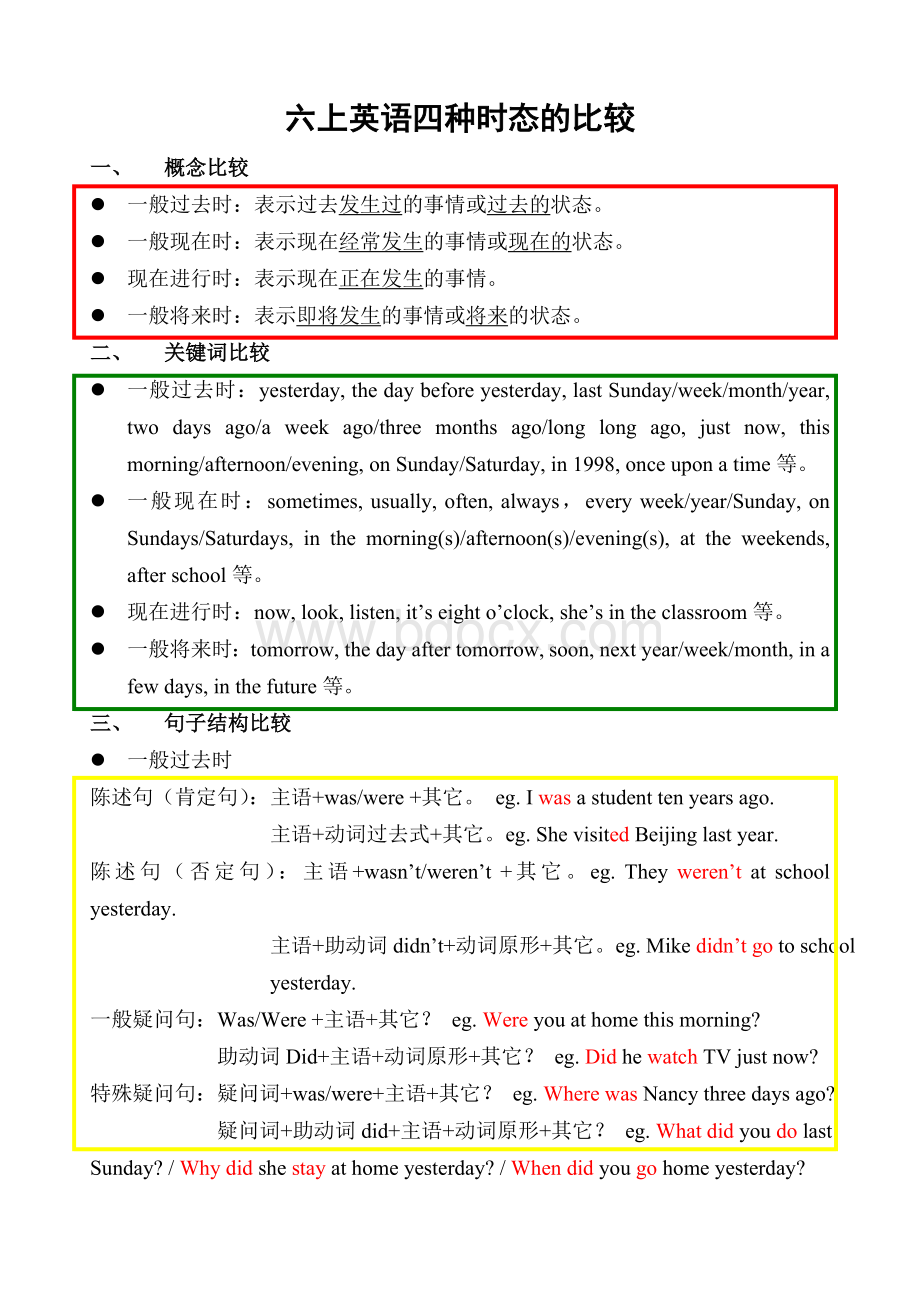六年级四种时态复习及练习.doc
《六年级四种时态复习及练习.doc》由会员分享,可在线阅读,更多相关《六年级四种时态复习及练习.doc(6页珍藏版)》请在冰豆网上搜索。

六上英语四种时态的比较
一、概念比较
l一般过去时:
表示过去发生过的事情或过去的状态。
l一般现在时:
表示现在经常发生的事情或现在的状态。
l现在进行时:
表示现在正在发生的事情。
l一般将来时:
表示即将发生的事情或将来的状态。
二、关键词比较
l一般过去时:
yesterday,thedaybeforeyesterday,lastSunday/week/month/year,twodaysago/aweekago/threemonthsago/longlongago,justnow,thismorning/afternoon/evening,onSunday/Saturday,in1998,onceuponatime等。
l一般现在时:
sometimes,usually,often,always,everyweek/year/Sunday,onSundays/Saturdays,inthemorning(s)/afternoon(s)/evening(s),attheweekends,afterschool等。
l现在进行时:
now,look,listen,it’seighto’clock,she’sintheclassroom等。
l一般将来时:
tomorrow,the day after tomorrow,soon,nextyear/week/month,inafewdays,inthefuture等。
三、句子结构比较
l一般过去时
陈述句(肯定句):
主语+was/were+其它。
eg.Iwasastudenttenyearsago.
主语+动词过去式+其它。
eg.ShevisitedBeijinglastyear.
陈述句(否定句):
主语+wasn’t/weren’t+其它。
eg.Theyweren’tatschoolyesterday.
主语+助动词didn’t+动词原形+其它。
eg.Mikedidn’tgotoschoolyesterday.
一般疑问句:
Was/Were+主语+其它?
eg.Wereyouathomethismorning?
助动词Did+主语+动词原形+其它?
eg.DidhewatchTVjustnow?
特殊疑问句:
疑问词+was/were+主语+其它?
eg.WherewasNancythreedaysago?
疑问词+助动词did+主语+动词原形+其它?
eg.WhatdidyoudolastSunday?
/Whydidshestayathomeyesterday?
/Whendidyougohomeyesterday?
l一般现在时
陈述句(肯定句):
主语+am/is/are+其它。
eg.Iamastudent.
主语+动词原形或三单形+其它。
eg.SheoftenreadsEnglish./Weusuallygowalkingintheevening.
陈述句(否定句):
主语+isn’t/amnot/aren’t+其它。
eg.Theyaren’tatschooleveryday.
主语+助动词don’t或doesn’t+动词原形+其它。
eg.Myparentsdon’tlikewatchingTV./Myfatherdoesn’tlikecooking.
一般疑问句:
Am/Is/Are+主语+其它?
eg.IsLiuTaoyourfriend?
助动词Do或Does+主语+动词原形+其它?
eg.Doyouusuallyhavelunchatschool?
/DoesYangLinggoshoppingonweekends?
特殊疑问句:
疑问词+am/is/are+主语+其它?
eg.Howoldareyou?
疑问词+助动词do或does+主语+动词原形+其它?
eg.Howdoyouspendyourweekends?
/Howdoeshespendhisweekends?
l现在进行时
陈述句(肯定句):
主语+am/is/are+动词ing形式(现在分词)+其它。
eg.ThestudentsarehavinganEnglishlessonnow.
陈述句(否定句):
主语+am/is/are+not+动词ing形式(现在分词)+其它。
eg.Look,thedogisn’tsittinginfrontofthedoor.
一般疑问句:
Am/Is/Are+主语+动词ing形式(现在分词)+其它?
eg.Listen,isHelensinginginthemusicroom?
特殊疑问句:
疑问词+am/is/are+主语+动词ing形式(现在分词)+其它?
eg.Whataretheydrawingnow?
l一般将来时
陈述句(肯定句):
主语+am/is/aregoingto+动词原形+其它。
eg.I’mgoingtowatchafilmtomorrow.
陈述句(否定句):
主语+am/is/are+notgoingto+动词原形+其它。
eg.Sheisn’tgoingtohaveapicnicnextSunday.
一般疑问句:
Am/Is/Are+主语+goingto+动词原形+其它?
eg.Areyourclassmatesgoingtoplayfootballsoon?
特殊疑问句:
疑问词+am/is/are+主语+goingto+动词原形+其它?
eg.Whenistheteachergoingtoteachusthesong?
注:
无论是哪个时态,都有如下原则:
1.有助动词do,does或did,实意动词(行为动词)用原形。
(简略:
见助动,用原形)
2.有情态动词can,could,should,must,might,will,would等,实意动词用原形。
2.有be动词,要么不能出现实意动词,要么实意动词用ing形式。
(简略:
be动、实动不同用,要么be动配现分)
六年级英语专项练习
班级姓名
一、用所给词的适当形式填空。
1.LastSaturday,it__________(rain).
2.He__________(write)anemailtohisfriendnow.
3.Don’t__________(run)intheclassroomnow.
4.LiuTao__________(bring)somebreadyesterday.
5.Wewent__________(fish)withmyfriendsthismorning.
6.Mikecouldn’t______(ride)bikessixyearsago.
7.We_______________(watch)afilmeverySunday.
8.They(take)abustogettherelastSunday?
9.It’s________(he)turn.
10.Doyouwant_________(go)tothefarm?
11.Look,YangLing(tell)astory.
12.Iwant(play)footballwithmyfriends.
13.What(do)youdothreeyesterdayago?
14.We(see)manymagicthingslastHalloween.
15.Mymotherdidn’t(have)amobilephonefouryearsago.
16.Myshoesaretoosmall.
Iwouldlike(buy)anewpair.
17.It(be)Sundayyesterday.
18.Fiveyearsago,he_________(can)rideabike.
19.NowTomcandomany_________(thing).
20.I___________(nothave)amobilephonenow.
21.Mike’sgrandpalikes__________(listen)totheradio.
22.Mymother_________(work)hardeveryday.
23.YangLing___________(wait)forthebusnow.
24.Please_________(put)yourhandsonthedesk.
25.Iwant__________(be)yourfriend.
26.Where________you________(go)yesterday?
27.MrBrown______(live)inTokyoin1990.
28.Helenusually_________(read)Englishintheevening.
29.What_______(do)yourfatherdolastMonday?
30.Weoften________(go)totheparkafterdiner.
31.He_________(see)afunnyTVshowlastweekend.
32.Lily_________(read)astorythedaybeforeyesterday.
33.Theboys________(visit)hisuncletwodaysago.
34.Theyoften______(clean)theirclassroomafterschool.
Look!
They_______(clean)it.
35.Please_______(pick)anorangeforme.
36.There____(be)ateachera